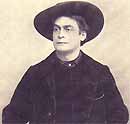Aristide Bruant (1851-1925)
Aristide Bruant was a prominent French singer, songwriter, and cabaret owner who gained popularity during the late 19th and early 20th centuries. Born on May 6, 1851, in the small town of Courtenay, France, Bruant’s unique style and captivating performances made him a beloved figure in the world of entertainment. Throughout his career, he left an indelible mark on the arts and continues to be remembered as a symbol of the bohemian lifestyle in Paris.
Early Life and Career
Bruant’s passion for music and performance emerged at a young age. Growing up in a modest family, he faced many challenges but remained determined to pursue his dreams. As a teenager, he left his hometown and moved to Paris, the cultural hub of France, to seek better opportunities in the arts. It was in the bustling streets of Montmartre that Bruant’s journey to stardom began.
With his deep, resonant voice and charismatic stage presence, Bruant quickly captured the attention of audiences. He began performing in various cafés and cabarets, honing his skills and establishing a reputation for his powerful performances. His distinctive attire, featuring a wide-brimmed hat, red scarf, and a long black coat, became his trademark, further enhancing his image as a rebellious and unconventional artist.
The Rise of Aristide Bruant
Bruant’s popularity soared in the late 19th century, and he became a central figure in the bohemian scene of Montmartre. He gained a loyal following for his songs, which often depicted the struggles of the working class and addressed social and political issues of the time. Bruant’s lyrics were raw, honest, and infused with a sense of realism that resonated deeply with his audience.
In addition to his musical career, Bruant also ventured into the world of entrepreneurship. In 1885, he opened his own cabaret, called “Le Mirliton,” which quickly became a gathering place for artists, writers, and intellectuals. The cabaret provided a platform for Bruant to showcase his talents and served as a haven for artistic expression and free thinking.
Legacy and Influence
Aristide Bruant’s impact on French culture and the arts cannot be overstated. Through his music and performances, he brought attention to the struggles of the working class, shedding light on societal issues that were often overlooked. His songs inspired other artists and paved the way for a new wave of social commentary in music.
Furthermore, Bruant’s cabaret, Le Mirliton, played a crucial role in the development of the cabaret culture in Paris. It became a platform for avant-garde artists and intellectuals to exchange ideas and challenge societal norms. The cabaret scene in Montmartre flourished under Bruant’s influence, and its legacy can still be felt in the vibrant artistic community of the area today.
Conclusion
Aristide Bruant’s life and career were characterized by a relentless pursuit of artistic expression and a commitment to addressing social issues through his music. His unique style and captivating performances made him a beloved figure in the world of entertainment, and his influence continues to be felt to this day. Through his songs and his cabaret, Bruant left an enduring legacy that remains an integral part of French cultural history.
Frequently Asked Questions
1. What were Aristide Bruant’s most famous songs?
Aristide Bruant’s most famous songs include “Nini Peau d’Chien,” “A Batignolles,” and “Dans la Rue.”
2. How did Aristide Bruant influence the cabaret culture in Paris?
Aristide Bruant’s cabaret, Le Mirliton, played a crucial role in the development of the cabaret culture in Paris. It provided a platform for avant-garde artists and intellectuals to express themselves freely and challenge societal norms.
3. What was the significance of Bruant’s attire?
Bruant’s distinctive attire, featuring a wide-brimmed hat, red scarf, and a long black coat, became his trademark. It enhanced his image as a rebellious and unconventional artist, further captivating his audience.
4. How did Aristide Bruant’s songs address social and political issues?
Bruant’s songs portrayed the struggles of the working class and shed light on social and political issues of the time. His lyrics were raw, honest, and infused with a sense of realism that resonated deeply with his audience.
5. What is the significance of Montmartre in Aristide Bruant’s career?
Montmartre, a neighborhood in Paris, was where Bruant’s career took off. The vibrant artistic community and bohemian atmosphere of Montmartre provided the perfect backdrop for his performances and allowed him to establish a loyal following.
In conclusion, Aristide Bruant’s contributions to music, performance, and the cabaret culture in Paris are immeasurable. His powerful voice, honest lyrics, and rebellious spirit continue to inspire artists and captivate audiences. Bruant’s legacy as a symbol of the bohemian lifestyle and a champion of social commentary lives on, ensuring that his influence will be felt for generations to come.
